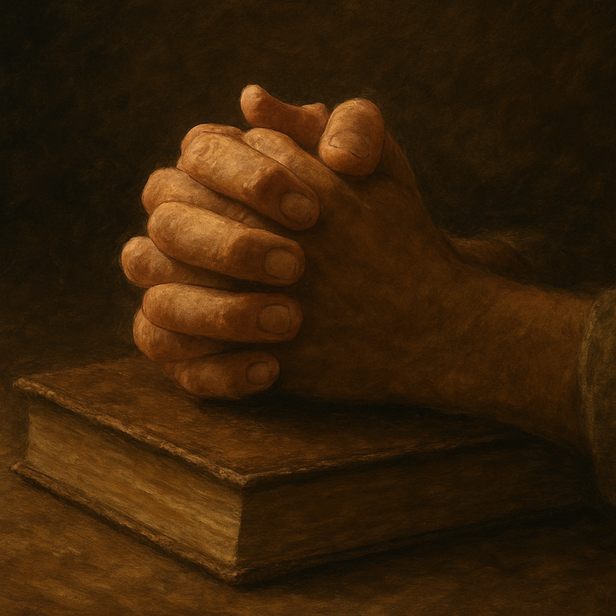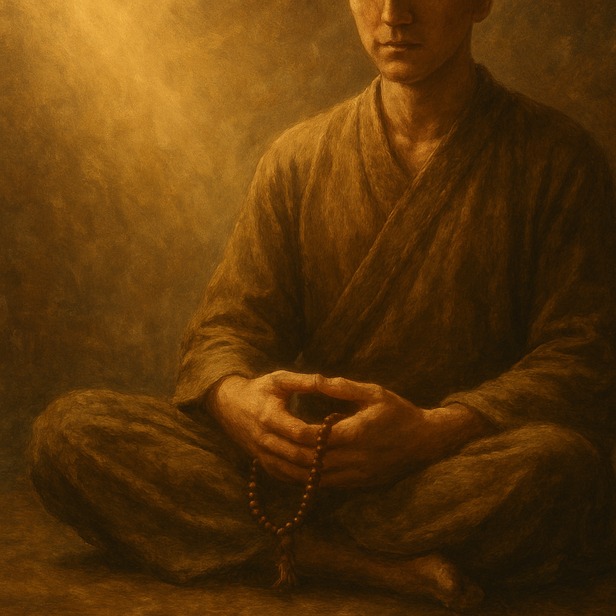Prayer as Therapy: Talking to God in Times of Anxiety
Charu Sharma | Sep 05, 2025, 09:49 IST
When the surrounding anxiety is so intense that it almost suffocates us, prayer is still available as healing and calming therapy for the troubled nerves. Conversation with God means giving up control, reflecting, safe releasing, having hope and strength. The article discusses the change that prayer brings about in human fear turning it to grace, thus making the letting go of control easier and comforting the soul through God’s help which keeps our hearts strong.
In a world where deadlines tighten around our chests, relationships strain under expectations, and the noise of constant comparison fills our minds, anxiety has become one of the most common battles people face nowadays. Although the anxiety is sometimes silent - the restless thoughts at night, the quickened pulse before an important talk, or the unshakable terror of "what if". However, spirituality still remains a different dimension which is the soul, despite therapy, medication, and lifestyle changes being the great and powerful tools in dealing with anxiety. Speaking from a therapeutic perspective, prayer is not just the act that brings us closer to God. It calms our racing thoughts, centers us, and broadens our view. It tells us that even though our worries seem to be the heaviest, we are not the ones who carry them. We can give them to God, believing in His wisdom and timing. This article explains how talking to God during anxiety can be therapy that reestablishes peace, faith, and strength.
1. The Power of Surrender: Handing Over Anxiety to God

One of the most exhausting aspects that anxiety brings with it is the illusion of control. Our minds persuade us that if we think over every detail enough, plan everything meticulously, or worry to the extreme, we would be in a position to stop the bad things from happening to us. However, the fact is that a big part of life is beyond our control. This truth keeps tension in our minds: we want certainty, but life is still unforeseeable. Instead of the anxiety that feeds on our need for control, prayer just brings us that God is the one who has the final word. A number of spiritual traditions rely heavily on this surrender. For instance, the Christian perspective in Philippians 4:6-7 instructs: “Do not be anxious about anything, but in every situation, by prayer and supplication, with thanksgiving, let your requests be made known to God.” The Sikh concept of Hukam (divine order) also suggests the believers to accept God’s will with trust. Giving up the struggle does not mean that one becomes passive but that one recognizes that we still do our part, yet the final result is up to God. Such a realization stops us from constantly engaging in our mental wars thereby giving us the chance to relax.
2. Prayer as a Safe Space: Expressing What We Cannot Say Aloud

Anxiety is an emotion that is likely to grow bigger when it is not talked about. These unspoken worries become larger in our minds, and sometimes they seem to be endless. For a lot of people it is hard to talk to their family or friends about the things they worry, maybe because they are afraid that they will be misunderstood or judged. Prayer is one way to a sacred place where there is no judgment, and any thought, no matter how incomplete or illogical, can be put forth without any embarrassment. Just like therapy asks the patients to talk about their emotions, prayer also demands believers to bring out their darkest fears to God. Occasionally, just uttering the words, “God, I’m scared of tomorrow,” can make the fear less powerful. In Islamic traditions, it is a demonstration of courage when one faces God with complete honesty, not weakness. When one talks to God, he or she is being straightforward without the fear of rejection. And this openness is the starting point of the healing process- it changes anxiety from one of being lonely to that of sharing with God.
3. Mindful Presence: Prayer as Meditation for the Anxious Mind

Anxiety is most of the time dragging us into those two extremes: remorse over the past or terror of the future. It is hardly ever giving us the chance to enjoy the moment. Prayer, if done with full concentration, becomes our support in the now moment. The act of prayer, no matter whether it is a psalm reciting, a mantra chanting, or a simple repetition of "Thank you, God," is working as a meditation. The brain that is doing this rhythm is starting to slow down its racing thoughts, the focus on the divine is taking us away from the endless series of "what if" thoughts. Even neurosientific studies are confirming that the repetition of prayer or chanting has a tranquillizing effect on the brain, the production of the stress hormones is lowered and the breathing pattern is stabilized. For instance, within the realm of Hinduism, "Om Namah Shivaya" chanting is not merely a part of the ritual but also a meditative act that calms the restless mind. Through the practice of prayer, anxiety gets weaker because it is not able to keep our focus. Instead of fear repetitions, which are our mind's favorite games, the mind is gently led to the truth of the Presence of God. This is the reason why so many people claim that a wave of calm is coming over them after prayer- it is not only spiritual but also neurological.
4. Replacing Fear with Hope: Prayer as a Source of Reassurance

Anxiety gets its energy from fear: fear of failure, rejection, losing, and the unknown. Fear narrows our view, which are we go on to see that worst-case scenarios are the only things that can happen. Prayer is a way to open a new window, a window of hope. In fact, when we pray, we communicate to ourselves that God's love is more than our fears. Prayer, as an act, turns around our focus: instead of dwelling on what could go wrong we use the certainty that there is still a chance of something good to happen. This transition from fear to hope doesn't get rid of the issues, but it does build up the strength of character. For example, a person who prays before a test or an interview at work, the result is still not known, however, the prayer act creates a feeling of calmness that comes from God’s support. Hope is a force that keeps the boat steady during the storm.
5. Building Resilience: How Prayer Strengthens the Anxious Heart

Therapy is not only structured to alleviate symptoms; it is designed to instil the resilience that makes one capable of handling the next challenges. In the same vein, prayer develops spiritual stamina for the long haul. Once prayer is turned into a habit, it equips the heart to go to God not only in the time of trouble but also in the ordinary days. Gradually, this becomes a strong base of faith that can resist all the anxiety causing situations. This doesn’t imply that we won’t be anxious anymore, but it does mean that we shall have the necessary tools to go through it. Concept prayer as spiritual exercise. Just as regular workouts build up muscles, regular prayer builds up the heart and the mind. Every prayer moment instills seeds of patience, bravery, and persistence.Moreover, the strength gained through prayer is not only a personal one but also a communal one. Group prayers like congregational worship or family prayers are another powerful source of strength as they remind people that they are not alone in their struggles. In this way, believers lean on God as a group and at the same time, they get supported by God as a group.
So in conclusion : Anxiety is not a defect, nor does it suggest that a person has no faith - it is inevitable human behavior that people get affected by in a much-accelerated and unpredictable world. Yet, prayer still serves as its perennial means of steering through the rough seas. If we look at prayer as a form of therapy, it becomes more than a mere custom: it is a God-healing, comforting, and strengthening dialogue. By learning to let go, prayer conveys the message of giving up control to God. In a completely safe space, it enables us to speak out what we hold inside and cannot share with others. Mindfulness through prayer keeps us here and now. Expectation in prayer is strong enough to dispel anxiety and take its place with trust. And through endurance, it equips us for the coming tempests. Sometimes deep anxiety is so that one’s heart is crushed to spleen, and then prayer utters its quiet voice, “You are not alone. God is listening.” And very often, that reminder is the strongest therapy of all.”
FAQs (Frequently Asked Questions) :
1. The Power of Surrender: Handing Over Anxiety to God

Person surrendering to god
( Image credit : Times Life Bureau )
One of the most exhausting aspects that anxiety brings with it is the illusion of control. Our minds persuade us that if we think over every detail enough, plan everything meticulously, or worry to the extreme, we would be in a position to stop the bad things from happening to us. However, the fact is that a big part of life is beyond our control. This truth keeps tension in our minds: we want certainty, but life is still unforeseeable. Instead of the anxiety that feeds on our need for control, prayer just brings us that God is the one who has the final word. A number of spiritual traditions rely heavily on this surrender. For instance, the Christian perspective in Philippians 4:6-7 instructs: “Do not be anxious about anything, but in every situation, by prayer and supplication, with thanksgiving, let your requests be made known to God.” The Sikh concept of Hukam (divine order) also suggests the believers to accept God’s will with trust. Giving up the struggle does not mean that one becomes passive but that one recognizes that we still do our part, yet the final result is up to God. Such a realization stops us from constantly engaging in our mental wars thereby giving us the chance to relax.
2. Prayer as a Safe Space: Expressing What We Cannot Say Aloud

Person praying
( Image credit : Times Life Bureau )
Anxiety is an emotion that is likely to grow bigger when it is not talked about. These unspoken worries become larger in our minds, and sometimes they seem to be endless. For a lot of people it is hard to talk to their family or friends about the things they worry, maybe because they are afraid that they will be misunderstood or judged. Prayer is one way to a sacred place where there is no judgment, and any thought, no matter how incomplete or illogical, can be put forth without any embarrassment. Just like therapy asks the patients to talk about their emotions, prayer also demands believers to bring out their darkest fears to God. Occasionally, just uttering the words, “God, I’m scared of tomorrow,” can make the fear less powerful. In Islamic traditions, it is a demonstration of courage when one faces God with complete honesty, not weakness. When one talks to God, he or she is being straightforward without the fear of rejection. And this openness is the starting point of the healing process- it changes anxiety from one of being lonely to that of sharing with God.
3. Mindful Presence: Prayer as Meditation for the Anxious Mind

Person praying
( Image credit : Times Life Bureau )
Anxiety is most of the time dragging us into those two extremes: remorse over the past or terror of the future. It is hardly ever giving us the chance to enjoy the moment. Prayer, if done with full concentration, becomes our support in the now moment. The act of prayer, no matter whether it is a psalm reciting, a mantra chanting, or a simple repetition of "Thank you, God," is working as a meditation. The brain that is doing this rhythm is starting to slow down its racing thoughts, the focus on the divine is taking us away from the endless series of "what if" thoughts. Even neurosientific studies are confirming that the repetition of prayer or chanting has a tranquillizing effect on the brain, the production of the stress hormones is lowered and the breathing pattern is stabilized. For instance, within the realm of Hinduism, "Om Namah Shivaya" chanting is not merely a part of the ritual but also a meditative act that calms the restless mind. Through the practice of prayer, anxiety gets weaker because it is not able to keep our focus. Instead of fear repetitions, which are our mind's favorite games, the mind is gently led to the truth of the Presence of God. This is the reason why so many people claim that a wave of calm is coming over them after prayer- it is not only spiritual but also neurological.
4. Replacing Fear with Hope: Prayer as a Source of Reassurance

Faith is the anchor in tough times
( Image credit : Times Life Bureau )
Anxiety gets its energy from fear: fear of failure, rejection, losing, and the unknown. Fear narrows our view, which are we go on to see that worst-case scenarios are the only things that can happen. Prayer is a way to open a new window, a window of hope. In fact, when we pray, we communicate to ourselves that God's love is more than our fears. Prayer, as an act, turns around our focus: instead of dwelling on what could go wrong we use the certainty that there is still a chance of something good to happen. This transition from fear to hope doesn't get rid of the issues, but it does build up the strength of character. For example, a person who prays before a test or an interview at work, the result is still not known, however, the prayer act creates a feeling of calmness that comes from God’s support. Hope is a force that keeps the boat steady during the storm.
5. Building Resilience: How Prayer Strengthens the Anxious Heart

People praying
( Image credit : Times Life Bureau )
Therapy is not only structured to alleviate symptoms; it is designed to instil the resilience that makes one capable of handling the next challenges. In the same vein, prayer develops spiritual stamina for the long haul. Once prayer is turned into a habit, it equips the heart to go to God not only in the time of trouble but also in the ordinary days. Gradually, this becomes a strong base of faith that can resist all the anxiety causing situations. This doesn’t imply that we won’t be anxious anymore, but it does mean that we shall have the necessary tools to go through it. Concept prayer as spiritual exercise. Just as regular workouts build up muscles, regular prayer builds up the heart and the mind. Every prayer moment instills seeds of patience, bravery, and persistence.Moreover, the strength gained through prayer is not only a personal one but also a communal one. Group prayers like congregational worship or family prayers are another powerful source of strength as they remind people that they are not alone in their struggles. In this way, believers lean on God as a group and at the same time, they get supported by God as a group.
So in conclusion : Anxiety is not a defect, nor does it suggest that a person has no faith - it is inevitable human behavior that people get affected by in a much-accelerated and unpredictable world. Yet, prayer still serves as its perennial means of steering through the rough seas. If we look at prayer as a form of therapy, it becomes more than a mere custom: it is a God-healing, comforting, and strengthening dialogue. By learning to let go, prayer conveys the message of giving up control to God. In a completely safe space, it enables us to speak out what we hold inside and cannot share with others. Mindfulness through prayer keeps us here and now. Expectation in prayer is strong enough to dispel anxiety and take its place with trust. And through endurance, it equips us for the coming tempests. Sometimes deep anxiety is so that one’s heart is crushed to spleen, and then prayer utters its quiet voice, “You are not alone. God is listening.” And very often, that reminder is the strongest therapy of all.”
FAQs (Frequently Asked Questions) :
- Can prayer really help with anxiety?
Yes, prayer provides comfort, calms the mind, and reduces stress. - How is prayer different from meditation for anxiety?
Prayer adds a spiritual connection, while meditation focuses on awareness. - Does prayer work even if I feel doubtful?
Yes, honesty matters more than perfection-God listens to sincerity.
